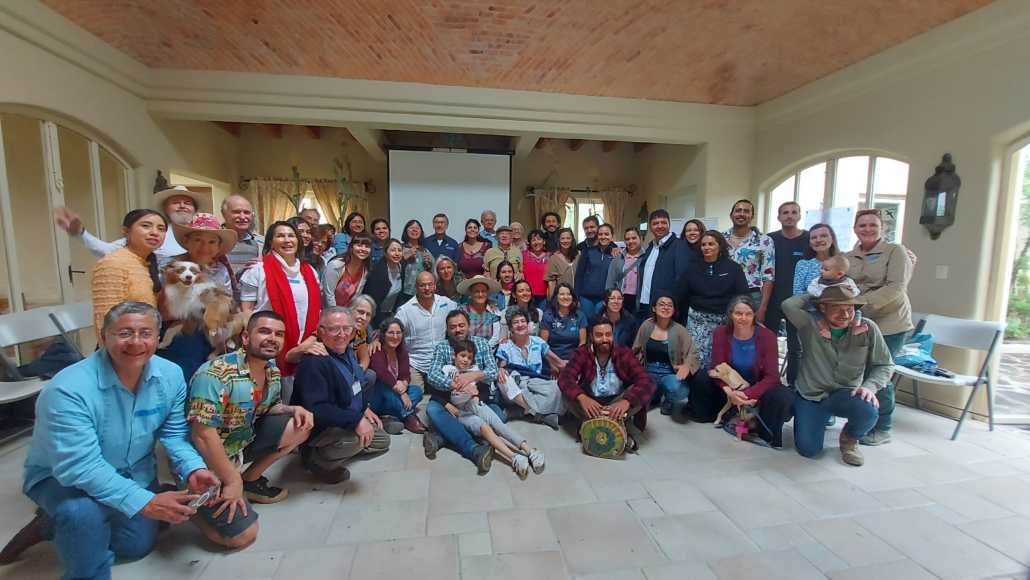What is the trial’s objective?
The class action’s goal is that federal courts declare or acknowledge the following four matters:
- That genetically modified organism (GMOs), GM, or transgenic corn have been released with no legal authorization.
- That the fact that GM corn exists in the field without permits, violates human rights to native corns biological diversity of current and future generations; to food; to health, to a healthy environment and cultural rights, amongst them free will.
- That the commercial release of GM corn will surpass established limits in that applicable legislation, which will generate human rights violations.
- That all permits to plant GM corn be denied in Mexico.
Precautionary measure SCJN ratification
A strategic advancement was the granting of a precautionary measure in September 2013 that prevents commercial planting of genetically modified corn, strengthening the background of the lawsuit, which does not intend an economic profit, but the definitive denial of permits for the release or planting of transgenic corn in the country, and that tribunals definitively ban planting of genetically modified corns in the center of origin and permanent diversification.
Since 2013 to date legal seeding of transgenic corn has been prevented in the Mexican territory. Pre-commercial and commercial permits are suspended by court order. Besides, since 2016, if the agribusiness attempts to plant for scientific purposes, it will have to subject itself to court reports and questionings by the collectivity and its scientists. For 7 years they have NOT dared to apply. By ruling of the SCJN (Supreme Court of Justice of the Nation), this measure will prevail until definitive resolution of the trial.
Despite over 130 challenges from the transgenic companies, precautionary measure was ratified by the Supreme Court of Justice of the Nation in August 2021, acknowledging the importance of upholding, and preserving cultural biodiversity through 64 races and thousands of corn varieties that, despite being the base of over 600 dishes and drinks, it is part of the integrality of traditions, culture, rites, and celebrations in Mexico.

Besides, the Supreme Court determined that judges that intervene in a class action trial can dictate any measure deemed appropriate to protect rights and interests of a Collectivity if it meets the law requirements.
This fact constitutes one of the biggest victories in defense of agri-food sovereignty not only for Mexico, but to all the world. Imagine one day, only one day with no corn, atole, tamales, gorditas, sopes, tlacoyos, tacos, tlayudas, popcorn, huaraches, chileatole, and corncobs, it would be a real tragedy. This ruling is also momentous for beekeeping sector and for bees themselves, as part of biodiversity, that have been severely affected by the admission of transgenics such as soy and corn, as well as agrochemicals usage such as glyphosate.
Thus, during these 10 years we must congratulate ourselves on the big international victory that represents stopping powerful transnational companies like Bayer-Monsanto, Syngenta, Dow Agrosciences and Phi Mexico (known as DuPont-Corteva) alongside of Sagarpa and Semarnat, authorities that were accomplices a decade ago, without a care of the pollution of native corns nor the fatality that their herbicide glyphosate, whose damages have been documented by dozens of scientific researches without conflict of interest; damages demonstrated by over 100 thousand lawsuits against Bayer-Monsanto in the United States because of damages caused by glyphosate, mostly for generating cancer.
“The Court ratifies: commercial planting of transgenic corn banned in Mexico”, October 13, 2021.
… Supreme Court of Justice of the Nation (SCJN) denied unanimously the Amparo under revision that was promoted in 2016 by the companies Bayer-Monsanto, Syngenta, PHI Mexico amongst others, to lift the Precautionary Measure which definitively banned genetically modified corn commercial planting in Mexico.
In the resolution project, drawn up by ministry Norma Lucía Piña Hernández, is established that at no time the 2016 ruling was in contradiction of the legal certainty and discretion principles, arguments that were invoked by the companies to lift the Precautionary Measure…
This court decision means that commercial planting of transgenic corn is still banned in Mexico, whereas experimental planting is permitted under certain conditions, such as previous notification to a judge…
This sentence, implies and advance compared to previous decades and legislations, was ratified today by the SCJN.
From the collective lawsuit against transgenic corn, we claim that “coexistence” of transgenic corn and native corn is not possible, according to research in other nations that demonstrate where transgenics are planted, there is contamination by pollen carried by the wind or pollinators action. To legalize planting will promote this contamination that directly threatens biodiversity and the most important agricultural genetic patrimony of Mexico, passed on by millions of farmers and indigenous peoples that created it and safeguard it today.

It is important to point out that being one of the most important cereals in the world by its production volume, versatility in use and adaptability to diverse climate conditions, corn has become a spoil for these companies, a rather juicy business that without the presidential decree, for the year of 2025 would have implied import of 39 million tons of yellow corns from the United States, over 90% GM, which would have resulted in a profit of 2,200 millions of dollars a year; besides de contamination of our native corns.
Juicy business that they’re missing on thanks to a decade of struggle and resistance by a community defending free, diverse, and resilient corn seeds and milpa produce, whose goal is ecological agriculture to fight climate change, defend and preserve traditional food, water, land and pollinators.
War intensifies from various fronts attacking the lawsuit, and presidential decree to gradually stop importation of glyphosate and protect native corns, as well as hinder laws to preserve maize and promote food sovereignty – from the head of Secretary of Agriculture and the National Agribusiness Council, ally of big transnationals -; but it is also important to highlight that resistance continues and grows, such as the “Moratorium of the People”, that bans transgenics on fields and tables.
Especially, the active resistance of the farmer and indigenous communities stands out, that despite all, they still produce milpa and corns allowing the richness of this big gene pool to continue. Communities have allowed that the milpa, millennial tradition to remain alive, as a model of farmer science that is part of the solution, through regenerative models, before the current planetary crisis.
Number 10 is sacred in diverse cultures and communities, such as Pythagoras claimed, for whom it represented action supporting us in what was learned. We hope that these 10 years we will continue attracting happiness, abundance, and above all to achieve our goal that the judicial authority declares the release of transgenic corns as harmful to the human right of biological diversity of native corns for current and future generations, just as health rights.
There still is a long way to travel to achieve the definitive prohibition of planting of GM Corn in Mexico, to protect the preservation and diversification of native corns, of milpa and the indigenous and farmers people’s rights, just as the right to a healthy environment and related rights. The sentence and Precautionary Measure will have far-reaching implications for the Collectivity of 125 million consumers, that defend the rights to biodiversity of native corns and to a healthy environment, without them food sovereignty and health protection cannot be guaranteed.
We invite you to keep informing yourselves about our defense of biodiversity and native corns through our social networks. We appreciate the media that have supported us through this important fight.
There still is a resolution left – what steps do we need to take for the definitive protection of Mexican corn? 125 million consumers.
Main Trial
The next trial stages have concluded: preliminary admission of the lawsuit, lawsuit certification (period that prevailed despite 11 amparo trials), conciliation hearing amongst parts with no agreement reached, preparation and submitting of evidence, trial’s final hearing, and presentation of final arguments.
On the file that at the present has approximately 23,000 pages, the jury made already established a date to give a judgement of trial in first instance, what could come about a few weeks or months, depending on their workload.
Future sentencing can be appealed from both parts, whilst in its considerations and resolutions, and in possible irregularities during procedure.
Defendants in this class action are: Monsanto, Syngenta, Dow Agrosciences, PHI Mexico, and the federal government through the secretaries of Agriculture and Environment; agency that, manifested to the federal courthouses that it will comply with the Decree that ordains federal authorities, under the law, amongst other things, deny planting of GM corn permits, published on December 31st, 2020 on the Official Journal of the Federation.
Before the judge resolves the class action trial, we won an Appeal Court Sentence in which the jury is ordained to take into consideration all the elements that are necessary to give a judgement (for example incomplete translation of scientific articles, that defendant companies pretend to hide during trial), and that Monsanto company does not have the privilege of presenting evidence without comply with requirements established by law.
In 10 years, 18 judicial bodies have known the class action corn, including First Chamber of the Supreme Court of Justice of the Nation, dozens of objections have been resolved, with a majority agreeing with the Collectivity.


